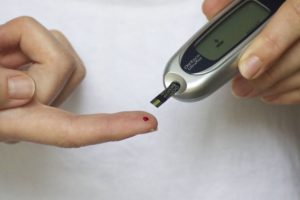There has been an increase of lifestyle related diseases over the years. According to the American Diabetes Association, over 30 million Americans are now suffering and trying to manage high blood sugar levels and been diagnosed with diabetes.
With proper management, this condition should be controllable enough to still be able to continue on daily routines and activities.
Sharing 12 easy ways managing your diabetes.
1. Awareness
Learning and acknowledging the condition is probably the most important thing to successfully manage high sugar levels properly. According to statistics, among the over 30 million Americans with diabetes, and 7.3 million are not appropriately diagnosed (http://www.diabetes.org/diabetes-basics/statistics/). This is very alarming considering the variety of ways to learn about it. There are thousands or facilities and different brands of screening tests and machines to help patients learn more about diabetes.
2. Education
 There are two types of diabetes, Type 1 and Type 2. Type 1 diabetes is when the body in not supplying insulin. This is needed for our sugar levels to be managed properly. Diabetes is very common these days that insulin is not that hard to find. Patients with this type of diabetes will have to supply themselves with insulin for the rest of their lives.
There are two types of diabetes, Type 1 and Type 2. Type 1 diabetes is when the body in not supplying insulin. This is needed for our sugar levels to be managed properly. Diabetes is very common these days that insulin is not that hard to find. Patients with this type of diabetes will have to supply themselves with insulin for the rest of their lives.
Type 2 is when the body does not produce insulin or it is unable to make use of it appropriately. When sugar in the blood is stays longer than normal, this is when we develop this condition.
3. Manage carbohydrate
Since the primary task on managing diabetes is to control sugar levels, learning how to count carbohydrate intake is essential. This is abundant in rice, oats, sweet potatoes, bananas, etc., and getting it in controlled amounts, helps your body to function and cope better with diabetes. Also, by knowing the amount of carbohydrates you intake, it would be easier to calculate the right dose of insulin for your body.
4. Plan your meals
 In managing diabetes, or any other condition, a well-balanced food intake is important. Having good portions of proteins, fats, fruits and vegetables can be really beneficial in maintaining good standing with diabetes. You may also consult your doctor or specialists like dieticians to be more specific on the proper meals you can intake that will not aggravate your condition.
In managing diabetes, or any other condition, a well-balanced food intake is important. Having good portions of proteins, fats, fruits and vegetables can be really beneficial in maintaining good standing with diabetes. You may also consult your doctor or specialists like dieticians to be more specific on the proper meals you can intake that will not aggravate your condition.
Spacing them out and plotting them in the calendar would be helpful. Setting a reminder on your phone or other applications would make it easier for you to shop and prepare meals in the future.
5. Always choose water
Having a night out with your friends, strolling in mall or an afternoon in the market can be exhausting and we can easily go to a vendo machine, pop a soda or go to the bar and ask for their house blend iced tea. As much as they are very tempting to ingest because of the refreshing feeling and good taste, water is still your best way to go. This is one very simple way but most patients are not strong enough to resist drinking those sugar-y beverages. Water has natural electrolytes and it is still be way refreshment for patients with diabetes
6. Don’t play with pointy objects
A primary symptom of patients with diabetes is that they take longer to heal. Increased blood sugar levels general make the immune system malfunction. Oxygen and other nutrients are hindered to be used properly that makes the body weak and slow to manage cuts and abrasions. Avoiding objects that can potentially puncture the skin is imperative in managing diabetes. It maybe a source of a new problem related to the existing condition which is very dangerous.
7. Familiarize yourself with baseline vital stats
Essential knowledge of what the normal values are in your health and lifestyle can save lives. In diabetes, and in other conditions, it makes a huge difference in managing and being independent of your conditions when you know how does the body normally tick.
Normal Vital Statistics are:
Blood Pressure – 120/80 mm Hg
Pulse rate – 60 to 100 beats per minute
Temperature: 97.8°F to 99.1°F (36.5°C to 37.3°C)
https://medlineplus.gov/ency/article/002341.htm
8. Managing stress levels
 Stress is a factor that can disrupt a human body. It is said the impact of a pleasant experience great for the body and it can do a lot of remarkable things. But when there are bad experiences, the impact of it in the body is more than three times of when we are happy.
Stress is a factor that can disrupt a human body. It is said the impact of a pleasant experience great for the body and it can do a lot of remarkable things. But when there are bad experiences, the impact of it in the body is more than three times of when we are happy.
Monitoring stress in diabetes can be very helpful when we learn its patterns. Weather it is physical, emotional or mental stress in diabetes, it results to an elevated blood sugar level since the body is lacking insulin and in diabetes patients, the fight-or-flight response is broken. Document when there are spikes on your sugar level and recall which event has taken place for you be more educated on which triggers your blood sugar to elevate.
9. Increase oral fluid intake
As the blood sugar piles up in the body, water can help flush excess amounts out. Keeping around a water bottle or regularly drinking water, helps your body to cope when there are increases in the amount of sugar in your blood. This helps to reduce the risk of destroying your kidneys when you have diabetes.
Ingestion of water in diabetes keeps normal hydration in diabetic patients since they are more susceptible to dehydration as the body works harder and reacts more to the debilitating condition.
10. Always have your glucometer ready
Especially in travelling with diabetes, the Glulco meter should always be kept handy. Alerting your self that you’ve had too much of that desert in a foreign country, or when you’re simply having fun at home, makes you more prepared on managing your increased or decreased blood sugar.
11. Keeping your needles safe
 Needle management in diabetes is often overlooked.
Needle management in diabetes is often overlooked.
- Keep them out of the reach of children at all times
- Make sure that they are always new
- Limit the number of caretakers of your needles
- Store them in room temperature
- Keep them dry as moisture harbours bacteria
12. Get regular exercise
 Physical activity in diabetics is imperative. Not only does the body gets stronger, but it maintains the patient’s blood sugar at normal levels more often. Muscles can use up the stored sugar in your blood without the use of insulin with movement and physical activity.
Physical activity in diabetics is imperative. Not only does the body gets stronger, but it maintains the patient’s blood sugar at normal levels more often. Muscles can use up the stored sugar in your blood without the use of insulin with movement and physical activity.
Taking brisk walks, a little bit of weight lifting or by just simply stretching your muscles can go a long way. Helping your body to learn how to move regularly reduces long terms risks in diabetic patients as well such as heart ailments and blockage of the arteries due to lack of movement.
Making yourself aware that this condition is highly manageable with these simple steps, really helps us to adjusts and be independent. Diabetes is not hard to manage as many of us would think. It would just need a bit of education and self awareness and having a good support system.
Diabetes is a lifestyle issue that can be easily fixed and with a few changes in the way do things. Keep yourself aware and be conscious as well on the food we put into your bodies.
